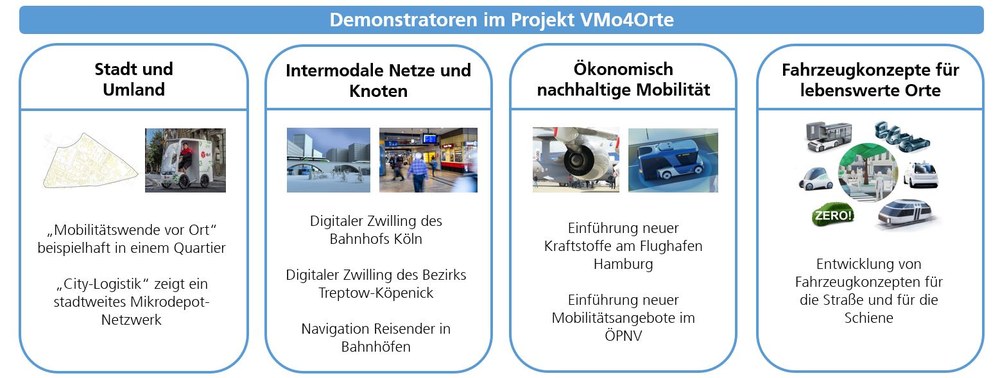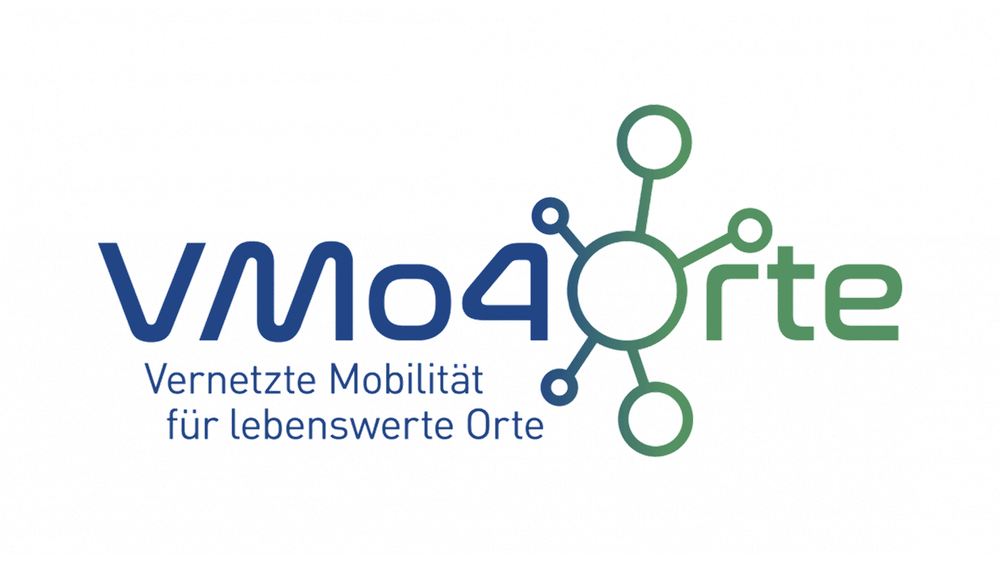Liveable places are climate-friendly, environmentally friendly, resource-conserving, fair, inclusive and safe and enable high-quality mobility and quality of life, good accessibility and ensure mobility participation for all in the long term. Their development requires a systemic transformation of mobility, taking into account new mobility services, urban structures, political and social framework conditions and individual behavioural changes.
Solution modules for liveable places
With the VMo4Orte research project, we offer solution modules that can be used to contribute to the transformation of the transport system. To this end, we are conducting targeted research across several areas and starting from a systemic perspective that is underpinned by our interdisciplinary expertise:
The solution modules range from research and further development
- intermodal transport networks and hubs,
- digital mobility management and navigation services,
- user-orientated business models for mobility concepts,
- new complete vehicle concepts for road and rail,
- reorganisation and mobility concepts for people and logistics in urban areas
- to the economic evaluation of these and the derivation of political measures to advise on future transformation strategies
This is done with a view to inclusive and diversity-orientated mobility requirements for passenger and freight transport systems. The individual solution modules are then integrated into cross-sector mobility concepts for urban spaces in neighbourhoods, cities or regions and further developed in practical applications with the participation of stakeholders. The overarching question at the heart of the research project aims to investigate how the cross-sectoral interaction of the solution modules for mobility and logistics concepts can succeed in a joint and transformative dialogue with stakeholders so that liveable, climate-resilient and competitive places can be designed in the long term.
Transferability and practical relevance through demonstrators
A total of six demonstrators will be tested in the project to transfer the partly experimental and practice-based mobility concepts and their solution modules from the various application and research areas. For later application and transfer to real-life conditions, it is important to integrate the mobility needs and requirements of both the population and stakeholders such as transport companies, public institutions and local authorities as well as companies from the mobility and logistics sector. For example, in the "local mobility transition" demonstrator, redesign measures in a neighbourhood are being considered together with stakeholders with regard to changes in noise pollution, the distribution of transport services, transport demand and the effects of the future integration of new mobility services and vehicle concepts. Solutions for potential implementation are developed and tested in dialogue with the population, municipal administrations, transport companies and businesses. These solutions ensure the transfer of individual needs and company-specific and municipal requirements into transferable and scalable applications in regional practice. They also serve as customisable templates for further applications.

Transfer through the involvement of project sponsors
Project sponsors from transport companies, public institutions and local authorities as well as companies from the mobility and logistics sector are involved in the work of the VMo4Orte project with their requirements and practical experience. Together with them, individual solution modules and emerging mobility concepts will be further developed in the project and implemented in demonstrators. The following project sponsors are involved in VMo4Orte (as of Oct. 2022):
- Senatsverwaltung Berlin
- Bezirksamt Friedrichshain-Kreuzberg
- Vodafone
- Regionalverband Großraum Braunschweig
- Bundesverband Paket & Expresslogistik BIEK
- Berlin Partner
- WISTA GmbH
- DHL
- GESOBAU
- LNC Berlin
- Onomotion GmbH
- KIEZBOTE
- Bringmeister
- Logistiknetzwerk Berlin Brandenburg
- eMO
- BdKEP
- Vitronic
- highQ Computerlösungen GmbH
- Stadtwerke München
- Nahverkehr Rheinland (NVR)
- Bezirksamt Treptow-Köpenick
- Flughafen Hamburg
- Vereinigung Passagier
- Verkehrs- und Traifverbund Stuttgart GmbH (VVS)
- Mercedes Benz Group
- Stadt Hamburg, Behörde für Verkehr und Mobilitätswende
- Ministerium für Verkehr des Landes Nordrhein-Westfalen
- Volkswagen AG
Project and sub-projects
VMo4Orte is funded from DLR's own resources. 19 DLR institutes and research organisations are involved in the project. The project is led by the Institute of Transport Research. The project is organised in four closely linked sub-projects (TP). Each of the four sub-projects is managed by a sub-project leader.
SP 1: City and surrounding area
The aim of the sub-project "City and suburbs" is to identify and develop customised mobility solutions and concepts for transforming transport and designing urban and suburban areas with a high quality of life.
The main questions of the sub-project are:
- How should liveable neighbourhoods be designed?
- Which usage scenarios make sense for neighbourhood-based vehicle concepts for passenger and freight transport?
- Which mobility services should be created in neighbourhoods to enable needs-based use?
- How can service concepts for micro-depots and climate-friendly last-mile delivery be implemented?
The methodology will be shown and evaluated in two demonstrators evaluated:
The "City Logistics" demonstrator shows the use of a city-wide micro-depot network. Suitable locations for micro-depots are identified and operator models with municipal participation are determined.
Using the example of Lausitzer Platz in Berlin, the demonstrator "Mobilitätswende vor Ort" shows the effects that new vehicle concepts (e.g. autonomous shuttles), new mobility services, technologies and drive systems can have on the modal split, accessibility of places, air pollution and noise emissions. In participatory processes with stakeholders from the district, the population and the economy, recommendations for the implementation of the new mobility concept will be developed and generalisation to other geographical areas will be evaluated.
Contact: Dr Simon Nieland, simon.nieland@dlr.de; DLR, Institute of Transport Research, Berlin
The sub-project is dedicated to researching the interplay of mobility and the role that transport hubs and the transport networks that connect them can play in this. The aim is also to take particular account of the need to enable individual mobility in line with demand and in a climate-neutral way.
The solution elements include
- Linking existing and new types of mobility services to create so-called intermodal transport services. These include, in particular, flexible, demand-responsive public transport, combined bus and air travel ("Bus&Fly") or the combination of intermodal long-distance freight transport with the German passenger transport cycle. If a journey is understood and marketed as integrated from start to finish, there are numerous new options for travellers to get from A to B. Overcoming the separation of individual services (e.g. train, plane, bus) to create modular components of individual travel chains could massively increase the attractiveness of public transport services.
- The targeted combination of motorised private transport and public transport via attractive transfer hubs offers the opportunity to attract new customer groups to public transport services that have previously relied solely on the car.
- The development of new service elements (e.g. innovative luggage and parcel service transport systems, user-centred navigation, availability of hydrogen as an energy source for means of transport, germ-free travel), which increase the attractiveness of the networks at mobility hubs.
The "Cologne Central Station", which is being implemented as a digital twin, serves as a case study and demonstrator. The twin serves as a traffic management basis for analysing changes in the network and node structure and services and evaluating their effects on traffic demand.
Contact: Dr Erik Grunewald, erik.grunewald@dlr.de; DLR, Institute of Transportation Systems, Braunschweig
SP 3: Economically sustainable mobility
The sub-project is dedicated to the development of ecologically favourable and at the same time economically viable and socially balanced solutions for the transport system of the future. This applies to all modes of transport and to both local and long-distance transport. Economic criteria such as overall economic costs, the benefits for travellers, employment effects, turnover and the ratio of investment costs to emissions saved serve as decision-making support for the design of technology and innovation paths, business models, political measures and frameworks. For example, we analyse the savings in climate-relevant gases that can be expected from the implementation of the 'Fit for 55 package' proposed by the EU Commission in 2021 in selected transport sectors and the associated economic effects (costs, turnover, employment, competition). Here we look at the period 2019-2040.
The solutions developed as part of TP 3000 include
- Introduction strategies for transport innovations such as new energy sources at transport hubs or demand-orientated, flexible and intermodal transport services in public transport
- Options for action and recommendations for politics and business with regard to the economic effects of business model-based innovations (e.g. sustainable fuels, mobility services) and political measures an
- Economic effects of resilience measures (resistance to crises) in the transport sector
As a result, we develop business models for innovations (e.g. sustainable fuels, mobility services) and political measures, introduction strategies for transport innovations in the economy and provide options for action and recommendations for politics and industry with regard to the economic effects of business model-based innovations and political measures.
The business models developed in the project are developed and set up in demonstrators in close cooperation with the sponsors. The focus is on
- the introduction of sustainable fuels (in particular hydrogen) at one or more medium-sized airports in Germany and
- the expansion of public transport services, taking current developments into account
Contact: Dr Janina Scheelhaase, janina.scheelhaase@dlr.de; DLR, Institute of Airport Research and Air Transport, Cologne
SP 4: Vehicle concepts for liveable places
The aim of the sub-project is to promote climate-friendly mobility by designing vehicle concepts for road and rail that make a user-orientated contribution to the mobility transition using renewable energies.
To this end, this sub-project:
- Requirements for vehicles collected - from the perspective of users and with regard to the environment, social impact and costs
- New concepts for sustainable vehicles developed and the technological maturity of existing modular, user- and utilisation-oriented vehicle concepts increased
- Engineering tools and methods for the development of modular, user- and utilisation-oriented vehicle concepts provided in order to be able to further develop vehicles more efficiently and support further innovations
The vehicle concepts for rail and road are implemented as demonstrators, some as mock-ups and virtual demonstrators as customised solutions for various transport applications.
Complex requirements such as specific customer expectations, acceptance problems and safety concerns, effects on transport and logistics processes or economic hurdles due to the use of new technologies and overall vehicle concepts are taken into account for the vehicle design.
Contact: Mascha Brost, Mascha.Brost@dlr.de; DLR, Institute of Vehicle Concepts, Stuttgart
Project duration
2022 to 2024
Budget
21.993 T€
Participating institutes
- Institut für Aerodynamik und Strömungstechnik
- Institut für Datenwissenschaften
- Institut für Fahrzeugkonzepte
- Institut für Flughafenwesen und Luftverkehr
- Einrichtung für Flugexperimente
- Institut für Kommunikation und Navigation
- Lufttransportsysteme
- Institut für Luft- und Raumfahrtmedizin
- Institut für Methodik der Fernerkundung
- Institut für Maritime Energiesysteme
- Institut für Physik der Atmosphäre
- Institut für den Schutz terrestrischer Infrastrukturen
- Institut für Softwaretechnologie
- Institut für Systems Engineering für zukünftige Mobilität
- Institut für Systemdynamik und Regelungstechnik
- Systemhaustechnik
- Institut für Verkehrssystemtechnik
- Institut für Vernetzte Energiesysteme
- Institut für Verkehrsforschung

